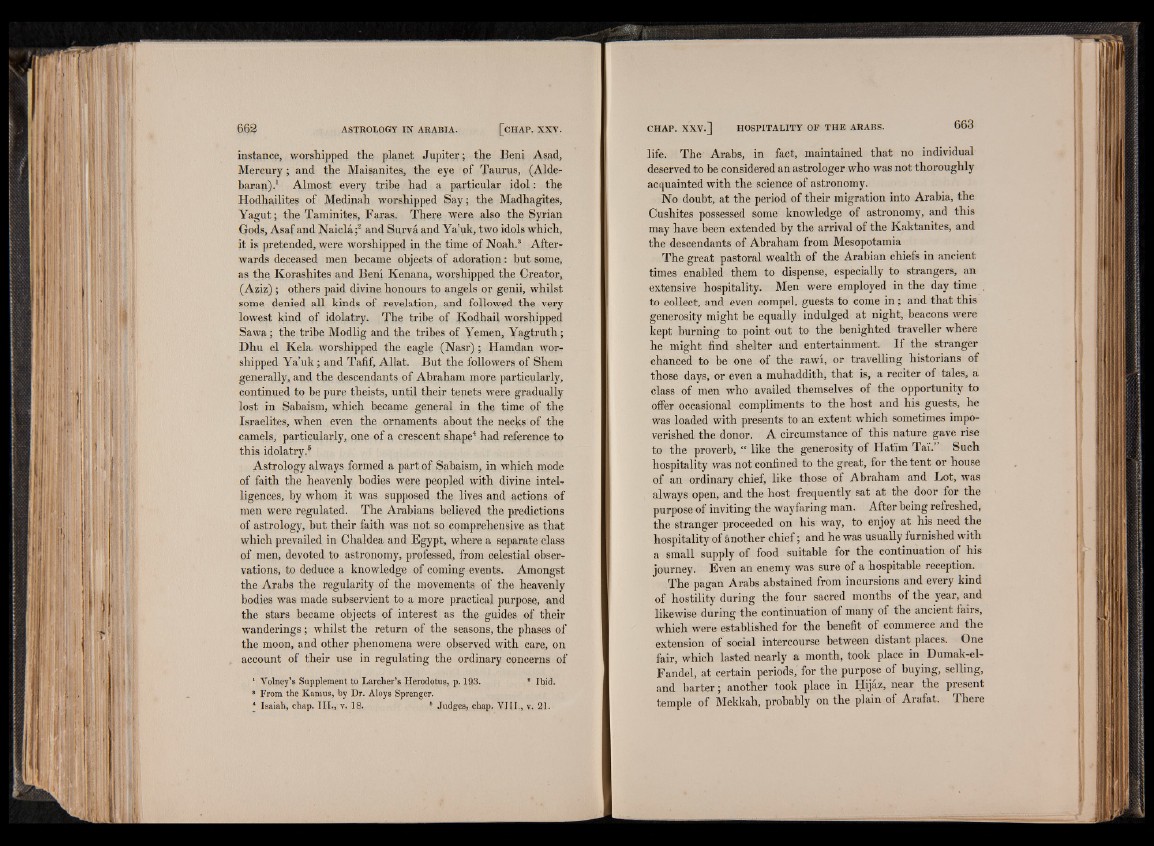
instance, worshipped the planet Jupiter; the Beni Asad,
Mercury; and the Maisanites, the eye of Taurus, (Alde-
baran).1 Almost every tribe had a particular idol: the
Hodhailites of Medijiah worshipped Say; the Madhagites,
Yagut; the Taminites, Faras. There were also the Syrian
Gods, Asaf and Naicla;2 and Surva and Ya’uk, two idols which,
it is pretended, were worshipped in the time of Noah.3 Afterwards
deceased men became objects of adoration: but some,
as the Korashites and Beni Kenana, worshipped the Creator,
(Aziz) ; others paid divine honours to angels or genii, whilst
some denied all kinds of revelation, and followed the very
lowest kind of idolatry. The tribe of Kodhail worshipped
Sawa; the tribe Modlig and the tribes of Yemen, Yagtrutfi;
Dhu el Kela. worshipped the eagle (Nasr); Hamdan worshipped
Ya’uk ; and Tafif, Allat. But the followers of Shem
generally, and the descendants of Abraham more particularly,
continued to be pure theists, until their tenets were gradually
lost in Sabaism, which became general in the time of the
Israelites, when even the ornaments about the necks of the
camels, particularly, one of a crescent shape4 had reference to
this idolatry.5
Astrology always formed a part of Sabaism, in which mode
of faith the heavenly bodies were peopled with divine intelligences,
by whom it was supposed the lives and actions of
men were regulated. The Arabians believed the predictions
of astrology, but their faith was not so comprehensive as that
which prevailed in Chaldea and Egypt, where a separate class
of men, devoted to astronomy, professed, from celestial observations,
to deduce a knowledge of coming events. Amongst
the Arabs the regularity of the movements, of the heavenly
bodies was made subservient to a more practical purpose, and
the stars became objects of interest as the guides of their
wanderings; whilst the return of the seasons, the phases of
the moon, and other phenomena were observed with care, on
account of their use in regulating the ordinary concerns of
1 Volney’s Supplement to Larcher’s Herodotus, p. 193. 8 Ibid.
8 From the Ramus, by Dr. Aloys Sprenger.
* Isaiah, chap. III., v. 18. 6 Judges, chap. VIII., v. 21.
life. The Arabs, in fact, maintained that no individual
deserved to be considered an astrologer who was not thoroughly
acquainted with the science of astronomy.
No doubt, at the period of their migration into Arabia, the
Cushites possessed some knowledge of astronomy, and this
may have been extended by the arrival of the Kaktanites, and
the descendants of Abraham from Mesopotamia
The great pastoral wealth of the Arabian chiefs in ancient
times enabled them to dispense, especially to strangers, an
extensive hospitality. Men were employed in the day time ,
to collect, and even compel, guests to come in ; and that this
generosity might be equally indulged at night, beacons were
kept burning to point out to the benighted traveller where
he might find shelter and entertainment. If the stranger
chanced to be one of the rawi, or travelling historians of
those days, or even a muhaddith, that is, a reciter of tales, a
class of men who availed themselves of the opportunity to
offer occasional compliments to the host and his guests, he
was loaded with presents to an extent which sometimes impoverished
the donor. A circumstance of this nature gave rise
to the proverb, “ like the generosity of Hat'im Tai.” Such
hospitality was not confined to the great, for the tent or house
of an ordinary chief, like those of Abraham and Lot, was
always open, and the host frequently sat at the door for the
purpose of inviting the wayfaring man. After being refreshed,
the stranger proceeded on his way, to enjoy at his need the
hospitality of another chief; and he was usually furnished with
a small supply of food suitable for the continuation of his
journey. Even an enemy was sure of a hospitable reception.
The pagan Arabs abstained from incursions and every kind
of hostility during the four sacred months of the year, and
likewise during the continuation of many of the ancient fairs,
which were established for the benefit of commerce and the
extension of social intercourse between distant places. One
fair, which lasted nearly a month, took place in Dumak-el-
Fandel, at certain periods, for the purpose of buying, selling,
and barter; another took place in Hijaz, near the present
temple of Mekkah, probably on the plain of Arafat. There